Pollen allergy: treatment and tips
Ear, nose and throat medicine(06.05.2025) The birds are chirping, the sun is shining: spring is here. For many, this is a reason to rejoice, but not for everyone, because the pollen season is starting. An expert explains how to treat pollen allergies.
Hazelnut, alder, beech, oak and ash. Between 20 and 30 percent of pollen allergy sufferers react to these so-called early bloomers with a runny nose, sneezing or itchy eyes. Alder and hazelnut often lead to allergic reactions, as their pollen is already flying through the air in March at temperatures of around 15 degrees Celsius. Allergy sufferers who react to birch pollen are particularly affected by hay fever in spring. "Some of the allergens from birch and other early bloomers look practically identical to the immune system, which is why people with birch allergies often have a general reaction to all early bloomers," says PD Dr. Tanja Hildenbrand, Senior Physician at the Department of Ear, Nose and Throat Medicine at the Freiburg University Medical Center.

Spring also marks the start of the pollen season. Many allergy sufferers react with a runny nose, sneezing or itchy eyes. ©Aleksej Sarifulin/iStock
What happens in our body when we have hay fever?
"Our immune system reacts incorrectly to harmless plant pollen by producing antibodies. If there is renewed contact, substances such as histamine are released," explains Hildenbrand. This can lead to the typical symptoms of an allergic reaction:
- Watery eyes
- Irritated conjunctiva
- Runny nose
- Constant sneezing
"In any case, you should have your suspicions checked out by a doctor when the first hay fever symptoms appear," says Hildenbrand. This is because many pollen allergy sufferers confuse a runny nose and itchy eyes with a cold. However, treating the allergy too late can lead to the allergies spreading to other allergens and allergic bronchial asthma years later.
Treatment options for hay fever
In principle, antihistamines and cortisone preparations can alleviate the symptoms and provide relief. Antihistamines are administered for topical treatment in the form of sprays, drops or tablets. Cortisone preparations, preferably in the form of nasal sprays, are used to treat the symptoms in the nose. The expert emphasizes: "Medication should always be discussed with your doctor. It is not advisable to take and use tablets and sprays on your own. We know that only a few allergy sufferers are really adequately treated".
If the preparations do not provide the desired relief and the allergic symptoms have been present for more than two years, there is the option of specific immunotherapy (SIT). "Patients are administered the individual allergy trigger as tablets, drops or injections over several years. This treatment leads to a change in the immune response to the allergen so that severe allergic reactions no longer occur during the pollen season," explains Hildenbrand. Hyposensitization is very successful: in around 70 percent of pollen allergy sufferers, the allergy can be successfully suppressed.
These immediate tips help with pollen allergies
- Find out when the pollen of the plants you are allergic to is in the air. The pollen count calendar is a good guide, and you should also keep an eye on the regional pollen count forecast.
- Get out into the fresh air when the pollen count is low: in the city, for example, ventilate early in the morning and ideally go for a walk after a rain shower - at these times there is very little pollen in the air.
- It can help to clean your home regularly. Vacuuming is particularly important here, ideally with a so-called "HEPA filter", a filter for suspended particles that removes pollen particularly thoroughly.
- Avoid hanging laundry outside to dry. This causes a lot of pollen to stick to your clothes, which can make hay fever symptoms worse.
- For a restful night's sleep, do not take off your clothes in the bedroom and do not leave them there either.
- Allergy sufferers should shower and wash their hair in the evening.
More interesting articles
Medical Center - University of Freiburg
Central InformationPhone: 0761 270-0
info@uniklinik-freiburg.de
Corporate Communications
Breisacher Straße 15379110 Freiburg
Phone: 0761 270-84830
kommunikation@uniklinik-freiburg.de



